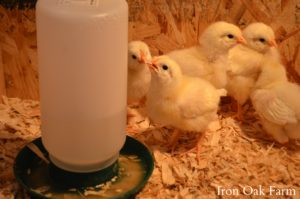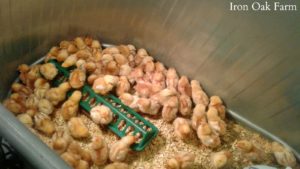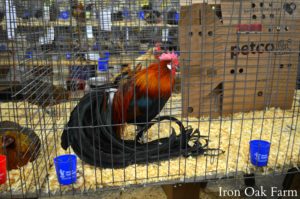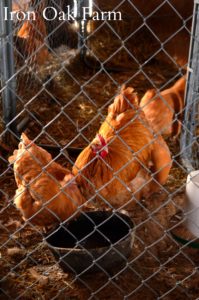 Everyone who wants a healthy flock should learn about Pullorum and how testing can help perpetuate a healthy poultry population.
Everyone who wants a healthy flock should learn about Pullorum and how testing can help perpetuate a healthy poultry population.
Who needs to be concerned with Pullorum and the NPIP?
The NPIP is technically a voluntary program, however, if you want to sell, move or show your chickens legally, you must be NPIP clean. If you are a casual backyard chicken keeper with a confined flock as your own pets/egg producers, NPIP certification isn’t something you necessarily need to concern yourself with.
Testing mostly effects:
-Breeders and hatcheries
-People who buy/sell/trade birds within the backyard poultry community
-4-H members
-People who show their chickens
-Someone who plans on shipping chickens or hatching eggs
State to state requirements:
Each state has its own set of requirements for selling/importing birds. All states require birds to be NPIP Pullorum clean, however, some require additional certifications like NPIP AI (Avian Influenza).
States that require NPIP AI Clean in Addition to Pullorum
North Carolina
Georgia
Florida
Virginia
Texas
Pennsylvania
Breeders and Hatcheries
 Large, well-known hatcheries will be certified to sell birds, this is part of their legal requirements to stay in business.
Large, well-known hatcheries will be certified to sell birds, this is part of their legal requirements to stay in business.
If you’re interested in buying from a smaller breeder, they usually advertise the fact that they are NPIP certified. If they don’t, I would find out what my state requires are and inquire if they meet the recommended needs.
People who buy/sell/trade birds within the backyard poultry community
Each state has different requirements for what is involved. In Michigan, anyone selling birds must be NPIP Pullorum certified. If you are selling outside your state, it is the seller’s responsibility to call the State Veterinary Services to find out what that state requires and to provide the proper paperwork. (More on this in my next post.)
4-H Members
.
 Most 4-H shows will test birds for Pullorum on-site before the show begins unless up-to-date certification is provided. A health certificate (also called a Certificate of Veterinary Inspection) may be accepted depending on your state requirements.
Most 4-H shows will test birds for Pullorum on-site before the show begins unless up-to-date certification is provided. A health certificate (also called a Certificate of Veterinary Inspection) may be accepted depending on your state requirements.
People who show their chickens
Most show flocks are already certified. When you register for a show you will have to provide paperwork showing up-to-date certification. Some shows may provide on-site testing, but this isn’t as common as it is with 4-H.
Someone who plans on shipping chickens or hatching eggs
 Because Pullorum Typhoid is an egg transferable disease (see my last post Why Chicken Keepers Need to Know about the NPIP and Pullorum Typhoid Disease) if you plan on only shipping hatching eggs, you’re not off the hook.
Because Pullorum Typhoid is an egg transferable disease (see my last post Why Chicken Keepers Need to Know about the NPIP and Pullorum Typhoid Disease) if you plan on only shipping hatching eggs, you’re not off the hook.
Again, it’s the seller’s responsibility to check what is required for that state.
But I see people selling chickens all the time without NPIP certification?
This is true. I see this myself on chicken forums/buy/sell pages. And there are a few things going on here.
Ignorance with NPIP
If you’re new to chicken keeping, you may find that you have too many of a breed, or you want to mate your chickens and see if you can sell the offspring. There’s really no reason for you to know that the NPIP exists. The only reason I found out about it was through a friend. Her daughter joined 4-H and they had to have their chickens tested. While chicken keeping is gaining in popularity, there’s still not a lot of awareness for these certifications so sales happen all the time without documentation.
Ignorance within the Post Office
Honestly, the post office system doesn’t know the requirements to ship chickens. People ship all the time who aren’t certified and the post office doesn’t know any better to ask for paperwork. So many people choose to take the risk and ship anyway.
Cost
 In some states, it’s quite expensive to get your flock certified. In Michigan, it’s around $300 to get the certification the first year. (It goes down to $120 after that) If you’re not a certified tester, then you have to pay someone to come test your flock. They may charge anywhere from $100 to $300 depending on how far away you live, and the size of your flock. Some small operations might not be able to afford these costs so they choose to ship illegally.
In some states, it’s quite expensive to get your flock certified. In Michigan, it’s around $300 to get the certification the first year. (It goes down to $120 after that) If you’re not a certified tester, then you have to pay someone to come test your flock. They may charge anywhere from $100 to $300 depending on how far away you live, and the size of your flock. Some small operations might not be able to afford these costs so they choose to ship illegally.
I’d be really interested to know why some states can certify for free, or very little costs and some states charge $300. But there you have it. I have mixed feelings on the whole issue, but I’ll leave that for another time. (More on costs in my next post.)
For the time being, the whole system is somewhat unregulated. But as chicken keeping gains in popularity, I feel like awareness is rising. I predict that eventually, NPIP Certification will settle in somewhere similar to the raw milk debate. Part of the reason I’m writing this series to prevent unaware chicken-keepers from being hit with a bunch of fines because they didn’t know otherwise.
For additional information, visit the NPIP website
Below is the video that they showed us in the Certified Tester Class. I will reference it throughout this series.
Check out my next post to learn how to get your flock certified.










